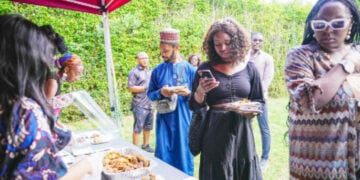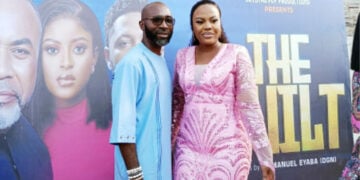As ‘Beautiful Camp 2’ wrapped up, observation shows that its true benefits lie in its quiet development of a democratic-minded Nigerian citizenry.
An initiative of the Jos Repertory Theatre (JRT), the camp is supported by the Czech Ministry of Foreign Affairs’ Transition Project, through the Czech Republic Embassy, to promote the principles of democracy, human rights and dignity in Nigeria, through the arts.
The chief objectives of the camp, adapted from the Transition Project, centre on collaboration amongst the camp’s participants, who are selected across the six geopolitical zones, and on the appreciation of the diverse perspectives/cultures of their peers from different parts of the country.
Between the first and second editions, collaborations across regions have flourished. From an A.I-infused documentary project on the girl child by Abuja-based film writer/costumier Osasogie Guobadia and Kano-resident broadcaster, Nazifi Abdullahi, to a content creation partnership between Jos-based playwright Abraham Omale and Paulinus Odinaka in Enugu, and business partnerships and referrals worth hundreds of thousands between camp participants, Odinaka and graphics/music artiste, Benaiah Jerry.
There is also an online photography collection in the works by camp participants. Beautiful Camp 2.0 saw an increase in participants and facilitators from 20 in 2024 to 36 this year.
The aforementioned are the physical and visible impacts of the camp by which its success is measured, said JRT founder and Beautiful Camp initiator, Dr Patrick Jude Oteh.
Nevertheless, the true gem of the camp is its unseen impacts—the internal changes it wrought in participants, which cannot be measured but over time yield a critical-thinking and public opinion-influencing citizenry—one that makes for a more democratically resilient society.
A good illustration is Odinaka, whose experience of the camp taught him the art of public speaking and self-awareness.
“It’s helped me master my content writing, the art of transmitting messages more diplomatically than bluntly. It’s also contributed to my tolerance of people. Having people with different personalities in one space for days has taught me to appreciate our similarities whilst respecting our differences,” Odinaka said.
Filmmaker Abbas Mustapha concurs. “There is freedom of speech in Nigeria, but that freedom is very sensitive. Before, I would speak in any way I pleased. Today, I have learnt the politics of talk. I also learned how better to manage people, particularly those in my production projects.”
Others, like Abba Dugga, a third-year student at the Theatre Arts Department, University of Lafia, Nasarawa, connected with the session on Trauma. While not everyone has the heart to engage in full-blown activism, she intends to pair her writing skills and the mobile documentary knowledge gained at the camp to write stories that address issues of trauma in Nigerian society.
“I want to be a scriptwriter who writes about the stories that have touched me and the things I hear. You can’t live in our current society and not be revolutionised by these ideas. As an alternative to attending bootcamps, which not a lot of people have the opportunity to do, they can watch a movie, one that highlights the many issues we discussed here, including trauma and freedom of speech, that will change the way they think,” Dugga said.
Filmmaker and founder of Purple Carpets Studios, Chinwendu McCoy, whose camp experience exceeded her expectations, aims to intentionally promote positive narratives of Nigeria in her works.
“Personally, I decided to tell more indigenous and authentic Nigerian stories this year to put Nigeria on the global map. I am definitely staying on that path, but beyond that, I will intentionally put all of these in my personal works that I have control over, and word the messaging in a manner that everyone understands without courting trouble.”
Witnessing these internal mindset changes induced by the camp justifies the Czech Embassy’s decision to expand camp participation this year and its understanding that the democratic changes sought by the Transition Project require time to manifest.
“This is a transition project, which means it is not necessarily a material achievement, but the change of mindsets, which will not happen overnight. We need to give it time for the seeds sown to germinate and blossom before returning to ask what’s next.
“This year, we have seen different approaches to some of the topics discussed last year, which is indicative that their continuation will yield better results than one-time action. We have also seen that this one year gave participants time to think about their projects,” Iwuanyanwu said.
On the fate of the camp, Dr Oteh isn’t worried as the impact of the camp is evidently expressed by the participants verbally and in action for the Czech Embassy to see.
“I want the participants to leave with a spirit of camaraderie, shared experience and the feeling that they are in the age of possibilities where anything is possible across zones and borders.”





